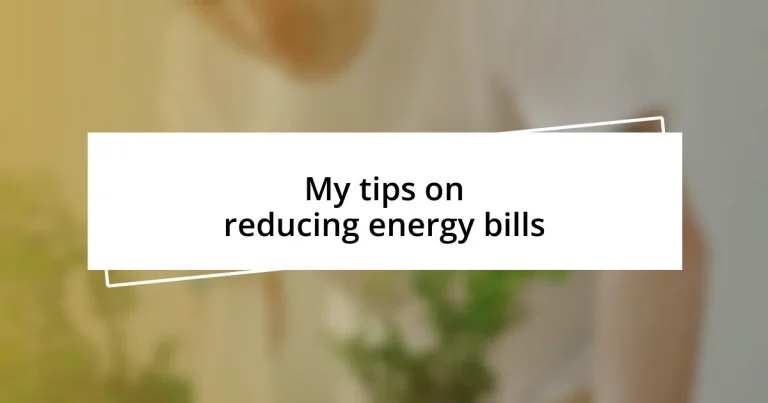Key takeaways:
- Understanding and tracking energy usage habits can lead to both financial savings and a healthier lifestyle through conscious choices.
- Implementing energy-efficient appliances and optimizing heating/cooling systems significantly reduces energy consumption and costs.
- Adopting smart home technology and regularly evaluating energy plans empowers users to manage energy more effectively and save on bills.
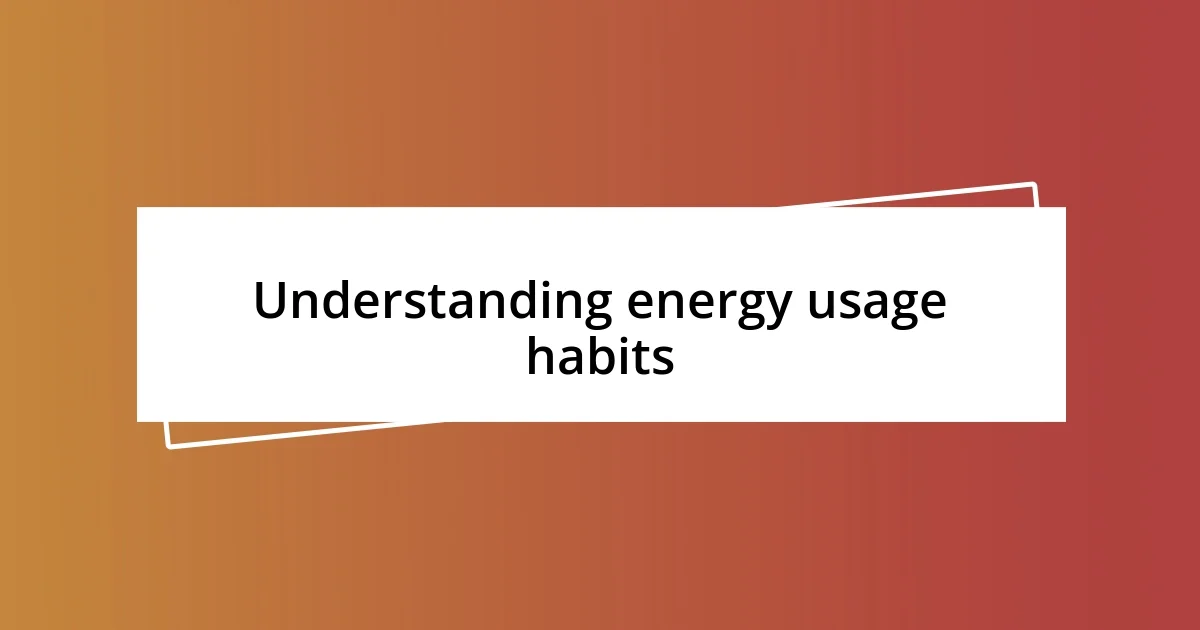
Understanding energy usage habits
Understanding our energy usage habits is vital. I remember when I first became conscious of how much energy I was consuming; it was eye-opening. I started paying attention to my daily routines—how long I left the lights on, which appliances I used most frequently, and the TV that seemed permanently tuned to background noise. It made me wonder: how many of us really think about the energy habits we form without even realizing it?
Tracking my usage revealed surprising patterns. For instance, I found that my microwave was a major culprit, humming away for minutes while I heated leftovers. It made me reflect on the efficiency of cooking methods we often take for granted. I began meal-prepping on weekends—something I never enjoyed before. Not only did it cut down on energy use during weekdays, but I also found myself enjoying healthier meals. Isn’t it interesting how small changes can lead to both savings and a shift toward a better lifestyle?
I’ve learned that understanding energy use isn’t just about numbers; it’s about choices, too. One chilly evening, I realized I could reduce my reliance on space heaters by layering up instead. I recall pulling on that cozy sweater and feeling a sense of pride—not just in saving money but also in embracing the comfort of my home. Have you ever made a similar choice? It’s these little moments that add up, creating a path to more conscientious energy consumption.
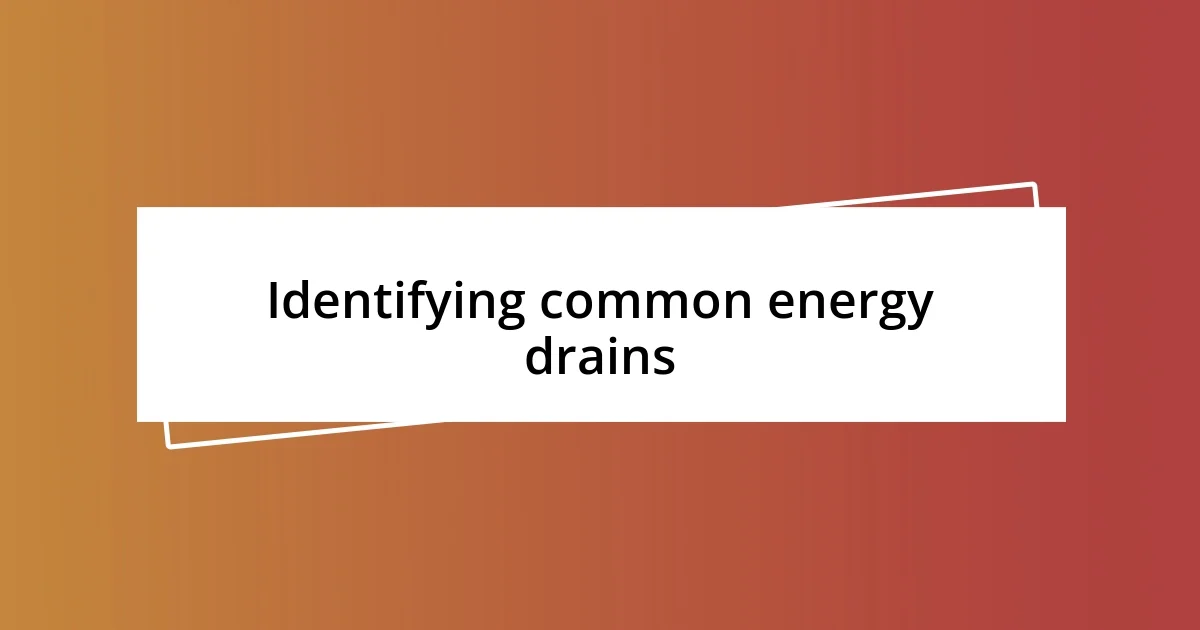
Identifying common energy drains
I’ve been surprised by how many everyday items contribute to higher energy bills when I took the time to really observe. For instance, I used to leave my phone charger plugged in overnight, thinking it was harmless. But then I discovered that idle chargers still consume electricity, known as phantom load. It’s a small change to unplug them when not in use, but it feels rewarding to see those savings add up over time.
To help identify common energy drains in your home, consider these culprits:
- Old appliances: They often consume more energy than newer, energy-efficient models.
- Heating and cooling systems: Inefficient systems or poorly sealed ducts can lead to substantial energy loss.
- Lighting: Incandescent bulbs use significantly more energy compared to LED lights.
- Phantom loads: Electronics left on standby can drain power around the clock.
- Hot water heaters: These can be set too high, leading to unnecessary energy use.
Reflecting on these areas in my own home, I made adjustments that not only decreased my bills but also heightened my awareness of energy consumption. It’s remarkable how tuning into these details can create a real impact. What about you? Have you noticed some energy drains lurking around your home?
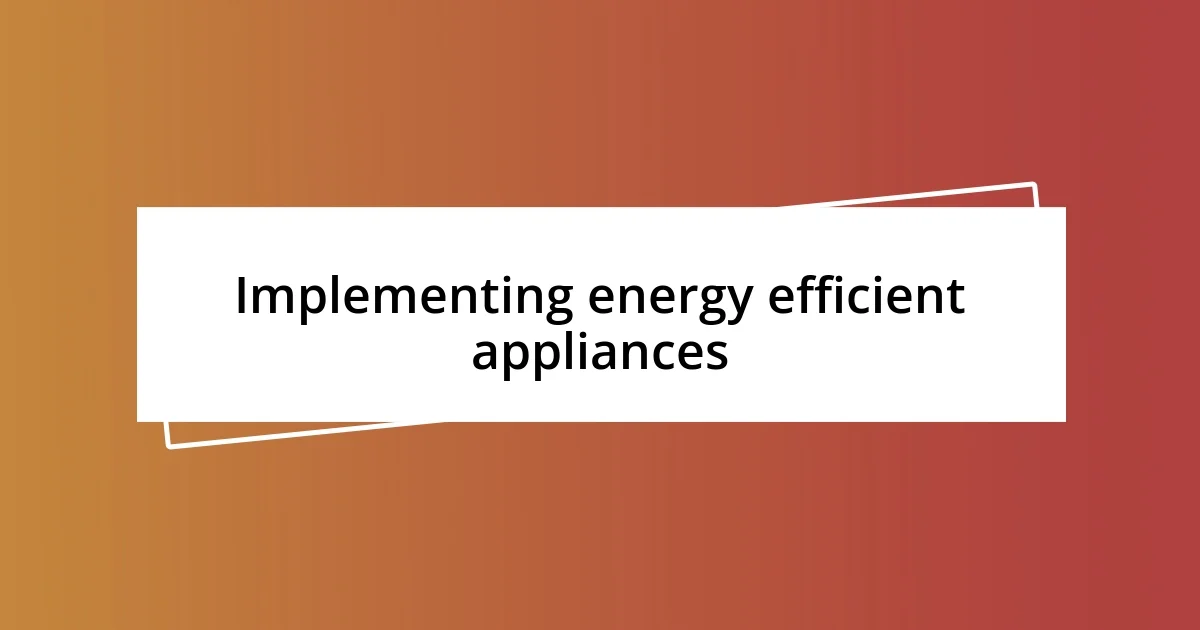
Implementing energy efficient appliances
Implementing energy-efficient appliances has been one of the most rewarding decisions I’ve made for my home. I still remember the day I replaced my old refrigerator. It was like saying goodbye to an old friend, but the new model promised to save me a considerable amount on my energy bills. And it did! The noticeable difference in my monthly statements felt like a small victory, proving that sometimes, letting go of the familiar can lead to unexpected benefits.
When I started researching energy-efficient appliances, I was struck by the range of choices available. For instance, I never thought much about my washing machine. However, I found that ENERGY STAR® certified models use about 25% less energy and 33% less water than standard machines. It was a no-brainer! I remember the day the new machine arrived; I felt a mix of excitement and responsibility, knowing I was investing in both my home and the environment. There’s something gratifying about seeing my bills shrink while also doing my part for sustainability.
I genuinely believe that these appliances reduce bills and enhance our quality of life. For example, I love my new dishwasher, which operates so quietly that I often forget it’s running. This quiet performance has allowed me to enjoy my evenings without the interruption of a noisy cycle. Let’s not forget the built-in timers and energy-saving modes that make it easy to minimize consumption. Have you ever tried running your appliances during off-peak hours? It feels like a smart hack that benefits both your wallet and the grid!
| Appliance | Energy Efficiency (Estimated Savings) |
|---|---|
| Old Refrigerator | ~15% more energy than newer models |
| ENERGY STAR Washing Machine | 25% less energy, 33% less water |
| Traditional Dishwasher | ~10% more energy than modern units |

Optimizing heating and cooling systems
When optimizing heating and cooling systems, one of the first changes I made was to schedule regular maintenance for my furnace and air conditioner. I can’t emphasize enough how much of a difference a clean filter and a well-tuned system can make. It not only improves efficiency but also extends the lifespan of the units. Have you checked your own filters lately? It’s surprising how often we overlook something so simple.
I remember the chilling realization when I discovered that sealing my ducts would help tremendously in preventing heat loss. After a bit of DIY sealing around the vents, the changes were palpable. My home felt warmer in winter and cooler in summer, all while using less energy. Isn’t it incredible how a few simple adjustments can lead to such comfort?
Moreover, I began using a programmable thermostat, which truly changed the game for me. I can set it to lower the temperature while I sleep and automatically heat my home before I wake up. This little piece of technology has not only made my life easier but also kept my energy consumption in check. Have you ever considered how much you could save just by being a bit smarter with your thermostat settings? It’s worth exploring!
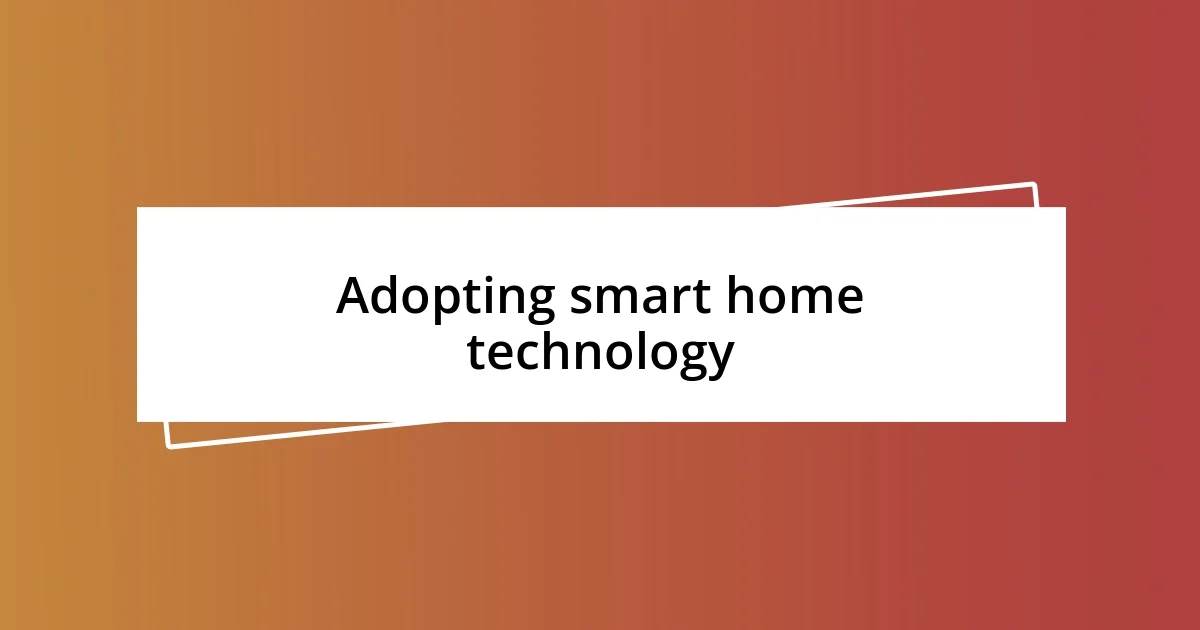
Adopting smart home technology
Adopting smart home technology has completely transformed the way I manage my energy use. When I installed smart plugs around my house, I was amazed at how easily I could control devices from my phone—no more leaving lights on or forgetting to unplug the coffee maker. It felt like stepping into the future; the convenience was undeniable, and it allowed me to monitor my consumption in real-time.
One of my favorite upgrades has been the smart thermostat. I can’t stress enough how much difference it has made. I love being able to adjust my home’s temperature while I’m away, ensuring I’m not heating or cooling an empty house. There’s a wonderful peace of mind in knowing that I’m not wastefully spending on energy while I’m out. Have you ever considered how that small adjustment can lead to significant savings at the end of the month?
Additionally, the integration of smart lighting has been an delightful surprise. The ability to set schedules for my lights means they only shine when needed, which seems trivial but adds up. I fondly recall a moment when I set my lights to automatically dim during movie nights—they created the perfect ambiance without my having to lift a finger. Isn’t it fantastic how technology can make our lives both easier and more energy-efficient?
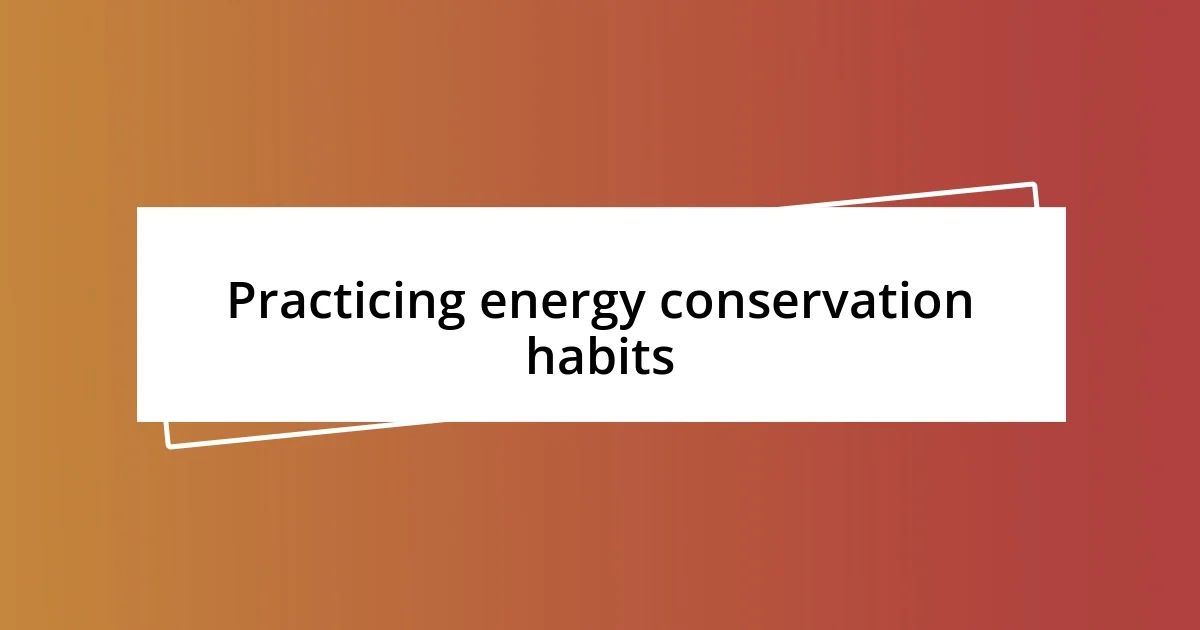
Practicing energy conservation habits
Practicing energy conservation habits has become a regular part of my life, and I’ve found a few strategies that really resonate with me. For instance, I started unplugging devices that I wasn’t actively using, like chargers and small appliances. It might seem like a minor thing, but the little energy savings add up over time. Have you ever taken a moment to think about how many energy vampires are lurking around your home?
One habit that transformed my approach to energy use was the simple discipline of turning off lights when leaving a room. I remember the first time I consciously avoided that urge to leave a light on, feeling a sense of accomplishment wash over me. It’s almost like a small victory that adds an air of responsibility in my daily routine. Have you felt that thrill of knowing you’re making a difference, even in such a small way?
Then there’s the practice of being mindful of laundry. Swapping out hot water for cold not only felt like an easy switch but also gave me a sense of control over my energy bills. I was pleasantly surprised at how effective cold water was in getting my clothes clean. Isn’t it empowering to discover that small changes in our habits can lead to both savings and a lighter environmental footprint?
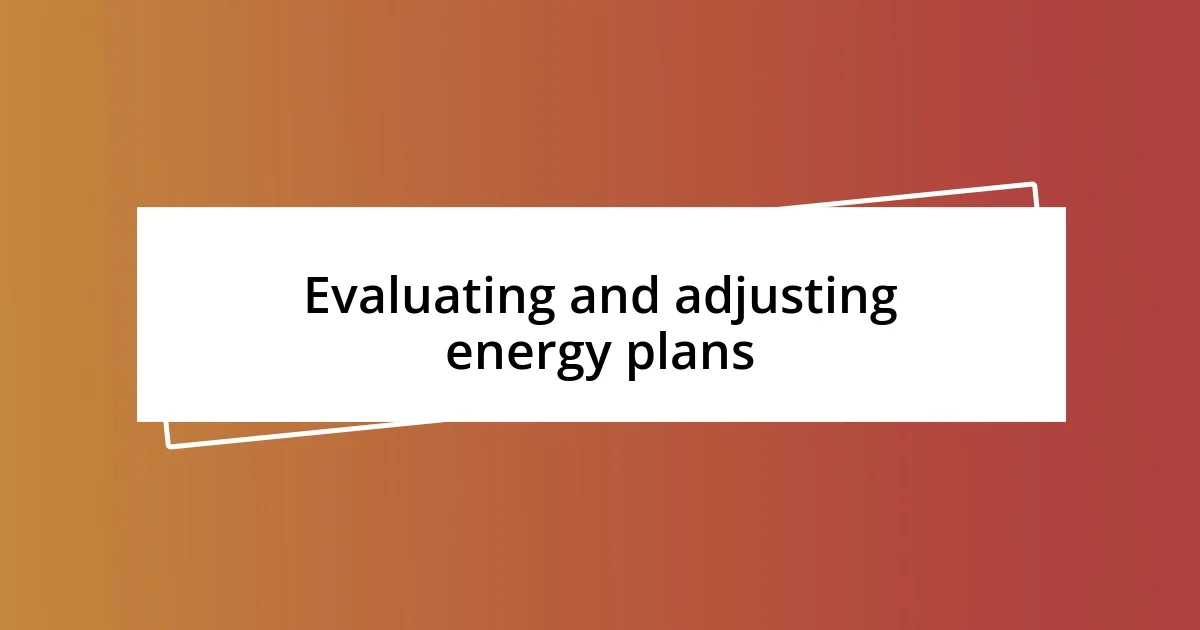
Evaluating and adjusting energy plans
Evaluating and adjusting your energy plans is a key step toward reducing bills, and I’ve found this process can be surprisingly enlightening. Recently, I took the time to review my energy provider’s rates and terms, and I discovered that I was on a plan that wasn’t as cost-effective as I had assumed. It was like seeing my energy expenses in a new light—have you ever had that moment where everything just clicks?
When I switched to a plan focusing on off-peak usage, I was amazed by the savings. I began doing my laundry and running the dishwasher during the night, and my bills dropped considerably. It felt rewarding to be proactive about my energy use—like I was finally taking control rather than just going with the flow. Isn’t it incredible how simply adjusting the timing of your usage can make such a significant difference?
I also learned the importance of regularly checking for loyalty discounts and promotions. The first time I called my provider to inquire, I felt a little apprehensive, wondering what they might say. Yet, I ended up with a reduced rate and a greater understanding of my energy usage. This small step led to not only savings but also a sense of empowerment—sometimes, it just takes a little inquiry to open doors to new opportunities. Have you considered how being proactive could reshape your relationship with your energy bill?












